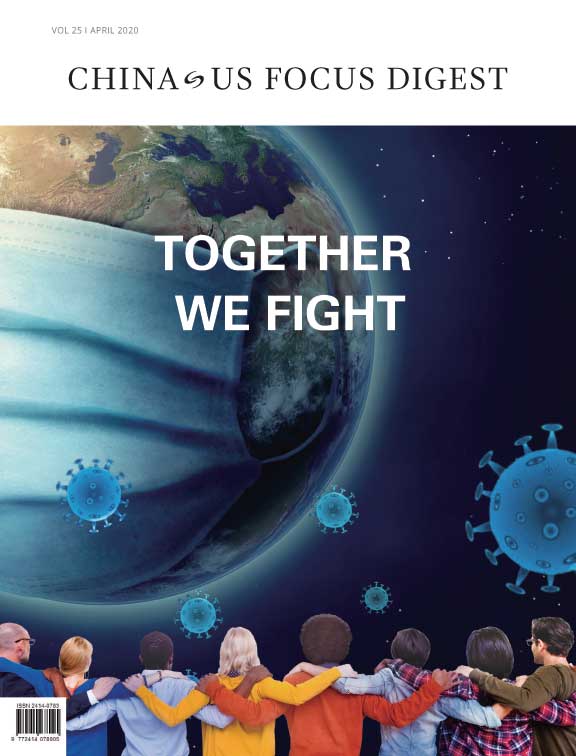Click here to read China-US Focus Digest
The spread of COVID-19 has demonstrated the need for global leadership not seen in nearly a hundred years.
In its spread, the world is witnessing a pandemic where, for the first time, the US has abandoned its traditional global leadership role and left many countries to deal with the deadly virus alone. Sadly, when collaboration between the two biggest economies—the US and China— is necessary, President Trump has chosen to blame China almost daily for the spread of the virus. In addition to these daily diatribes, the US Secretary of State led an unsuccessful bid to label COVID-19 as the ‘Wuhan virus’ in the G-7 communique— after the Chinese city where the virus was first detected.
Except for very early missteps, China defied the predictions of a ‘Chernobyl moment’ and handled the outbreak with alacrity and firmness. As China contained the virus, the US and Europe, demonstrating a lack of preparedness and resourcefullness, suffered large outbreaks of their own. While the US banned flights and suffered acute shortages of essential supplies, China became a global supplier of these necessary materials to fight the pandemic.
The efficient handling of the crises in China demonstrates its capabilities and governance standards. While the Chinese policy responses seem based on science, the US president seems focussed on his re-election bid in determining policy options to confront the deadly virus. No wonder 1.42 million in the US have been infected as of May 13 and a death toll of over 84,700, surpassing any other country in the world.
The US and China are on a collision course especially since Trump’s assumption of power in January 2017. The fall out from COVID-19, instead of aligning for a global response, is pulling them apart. The White House has turned a human disaster into a geopolitical contest with China. The trade and technology war Trump launched against China now engulfs all facets of their relationship.
Following its phenomenal economic and technological growth, China’s clout is growing worldwide. In 2018, the World Intelectual Property Organization granted 432,147 patents to China, against the 307,759 granted to the US. China is also the world’s second-largest economy, making it crucial to solving global challenges like COVID-19. Also, being the ‘factory of the world’ and the world’s biggest trading nation makes much of the world rely on China for goods and economic development. In 1990, China was only 3 percent of global GDP while the US had 20.6 percent. In 2018, China has 18.6 percent against the US’s 25 percent.
More and more countries are, therefore, resisting US pressure and are opting for closer economic relations with China. They want capital, technology, and investment, which China provides. The US, short of capital itself, first stokes fear, then sells military hardware, and mistakenly believes that selling arms is the best foreign policy pathway.
The world has watched with dismay as the US has walked away, all while preaching ‘America First’ during the COVID-19 crises. Meanwhile, the Chinese have quietly come forward to provide much needed urgent supplies.
All of these policies represent America’s short-term act to hamstring China instead of investing in its own ability to compete with China in manufacturing, technology, and innovation.
Trumps’s decision to cut WHO funding in the midst of the biggest global pandemic in a hundred years is a part of the American assault on global institutions. And this action undermines American leadership itself.
Mr. Trump’s focus on holding China responsible for the virus (specifically, it’s unfounded leak from a Wuhan laboratory) and China intentionally spreading it to Europe and the US has been dismissed categorically by WHO Health Emergencies Program Executive Director, Dr. Michael Ryan. Such a focus places the US out-of-step with most countries in the world, most of whom are not willing to join in the American narrative against China. Richard Horton, Editor-in-Chief of the prominent British Medical Journal, The Lancet, has dismissed these suggestions. The journal, he claims, published five articles in January warning of the deadly virus and yet the US and Europe paid little heed in February and early March.
The UN Secretary-General, Mr. Antonio Guterres, has lamented what he calls a lack of global leadership in fighting the pandemic: “How could the world deal with the crises in developing nations who are more at risk?”
Playing a blame game against China undermines the US’s tradition of leadership, puts a spotlight on the US’s inadequate response when the virus first broke out stateside, and brings into focus how little the US is ready to work with others and use its expertise, power, and resources to collectively confront global crises.
The US is acting like a retreating army fighting and simultaneously destroying the structures it had built to protect itself, while somehow still hoping to deny advantages to incoming forces.
COVID-19 will dent China-US relations further. The consequences of America’s discomfort at China’s rise and its attempts to contain the virus will damage the international community.

